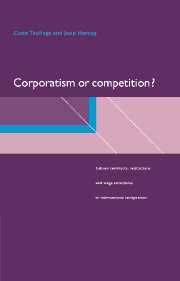 Corporatism or Competition?
Corporatism or Competition? Book contents
- Frontmatter
- Contents
- Preface
- Symbols and abbreviated references
- Synopsis
- 1 What we observe and what we claim
- 2 The role of corporatism in models of surplus sharing
- 3 Beliefs, norms and institutions
- 4 Union behaviour
- 5 Wage differentials and rent sharing
- 6 Tenure wage profiles
- 7 Unemployment and wage flexibility
- 8 Inside corporatism: how the Dutch play their game
- 9 An assessment: competition or corporatism?
- References
- Index
2 - The role of corporatism in models of surplus sharing
Published online by Cambridge University Press: 23 November 2009
- Frontmatter
- Contents
- Preface
- Symbols and abbreviated references
- Synopsis
- 1 What we observe and what we claim
- 2 The role of corporatism in models of surplus sharing
- 3 Beliefs, norms and institutions
- 4 Union behaviour
- 5 Wage differentials and rent sharing
- 6 Tenure wage profiles
- 7 Unemployment and wage flexibility
- 8 Inside corporatism: how the Dutch play their game
- 9 An assessment: competition or corporatism?
- References
- Index
Summary
Introduction
Smooth neo-classical equilibrium models may be useful for analysing some problems, they do not give an adequate picture of all aspects of real life labour markets. For the present chapter, two of these aspects not explained in the competitive model are of interest. First, the widespread use of nominal contracts is hard to square with a competitive auction market model. Second, the model offers no rationale for the existence of corporatist institutions. Since a Walrasian market yields an efficient allocation of labour, resources spent on writing contracts or maintaining corporatist institutions are a waste. Abolishing these institutions would increase efficiency. In this chapter we will argue that if nominal contracts have an efficiency promoting role then corporatist structures can support this role.
Many theories of corporatism start at a relatively high level of aggregation. But we will work bottom-up and start from the micro level. We take a basis in some existing models at the lowest level of aggregation: an employment relation between a worker and a firm. These models explain why contracts are a more efficient institution than the Walrasian auctioneer. Providing a rationale for the role of nominal contracts is the key to understanding the role of corporatist institutions. The basic notion is that many employment relations are characterized by a one-to-one relation between worker and firm. Such relations emerge when specific investments are required. Contracts and corporatist institutions play a crucial role in the distribution of surplus created by these investments.
- Type
- Chapter
- Information
- Corporatism or Competition?Labour Contracts, Institutions and Wage Structures in International Comparison, pp. 64 - 105Publisher: Cambridge University PressPrint publication year: 1998


